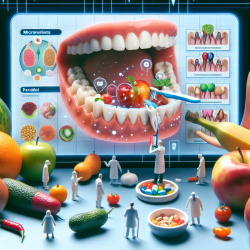Micronutrients and Periodontal Health: Insights for Practitioners
The relationship between nutrition and periodontal health is an area of growing interest, particularly for practitioners seeking to enhance their skills and improve patient outcomes. A recent study titled Influence of Micronutrient Intake, Sociodemographic, and Behavioral Factors on Periodontal Status of Adults Assisted by a Public Health Care System in Brazil: A Cross-Sectional Multivariate Analysis provides valuable insights into how micronutrient intake can influence periodontal health, particularly in low-income populations.
Key Findings
The study, conducted in Brazil, evaluated the periodontal health of 450 adults and found that micronutrient intake, particularly of omega-3 fatty acids, fiber, and zinc, was significantly associated with periodontal status. Participants with higher intakes of these nutrients had better periodontal health, while those with lower intakes were more likely to have poor periodontal health.
Implications for Practitioners
For practitioners, these findings underscore the importance of considering nutritional factors in the management of periodontal health. Here are some actionable insights:
- Assess Nutritional Intake: Incorporate questions about dietary habits into patient assessments to identify potential nutritional deficiencies that may impact periodontal health.
- Promote Nutrient-Rich Diets: Encourage patients to consume diets rich in omega-3 fatty acids, fiber, and zinc. Foods such as fatty fish, nuts, seeds, whole grains, and leafy greens are excellent sources.
- Collaborate with Nutritionists: Work with nutritionists to develop comprehensive care plans that address both oral and nutritional health.
- Educational Initiatives: Develop educational materials and workshops to inform patients about the connection between diet and periodontal health.
Encouraging Further Research
While this study provides valuable insights, it also highlights the need for further research, particularly in diverse populations and settings. Practitioners are encouraged to stay informed about the latest research in this area and consider participating in studies that explore the intersection of nutrition and oral health.
Conclusion
The study's findings emphasize the critical role of nutrition in maintaining periodontal health. By integrating nutritional assessments and interventions into practice, practitioners can enhance patient care and contribute to the broader goal of improving public health outcomes.
To read the original research paper, please follow this link: Influence of Micronutrient Intake, Sociodemographic, and Behavioral Factors on Periodontal Status of Adults Assisted by a Public Health Care System in Brazil: A Cross-Sectional Multivariate Analysis.










